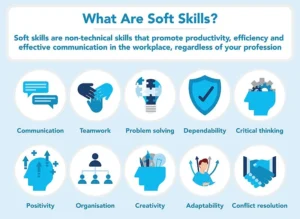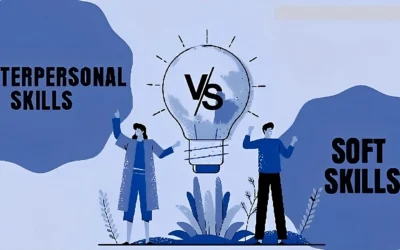why soft skill training is essential?
Why soft skill training is essential because they enhance our ability to interact effectively with others and navigate various professional and personal situations. Here are several reasons why soft skill training is essential:

- Improved Communication: Soft skills like communication and active listening are fundamental in any setting, enabling better understanding and conveyance of ideas, leading to fewer misunderstandings and more productive conversations.
- Enhanced Teamwork: Collaboration and teamwork are often essential in workplaces. Soft skills such as empathy, conflict resolution, and cooperation contribute to creating a positive and efficient team dynamic.
- Leadership Development: Effective leadership relies heavily on soft skills like emotional intelligence, empathy, and decision-making. These skills are crucial for inspiring, motivating, and leading teams toward common goals.
- Adaptability: Soft skills enable individuals to adapt to changing environments and circumstances more easily. Skills like flexibility and problem-solving help in navigating unforeseen challenges.
- Career Advancement: Employers increasingly value soft skills in addition to technical expertise. Strong soft skills can set you apart in job interviews, aid in career progression, and make you more valuable in various roles.
- Customer Service Excellence: Industries centered around customer service require strong soft skills. Empathy, patience, and communication skills are critical for delivering exceptional service.
- Personal Development: Soft skills contribute significantly to personal growth. They can improve self-confidence, resilience, and emotional well-being, fostering a more fulfilling personal life.
In summary, while technical skills are necessary, it’s the combination of technical expertise and strong soft skills that often leads to success in both professional and personal realms. Soft skill training helps individuals become well-rounded and adaptable, essential in today’s dynamic and interconnected world.
Some example of Soft Skills:
Soft skills like political grooming and professional anchoring involve a blend of interpersonal, communication, and behavioral abilities. Here are some soft skills related to these areas:
- Persuasion: Ability to influence opinions and decisions.
- Negotiation: Skill in reaching agreements and consensus.
- Networking: Building and maintaining relationships for mutual benefit.
- Diplomacy: Tactfulness in handling sensitive or complex situations.
- Public Speaking: Effective communication in front of various audiences.
- Strategic Thinking: Planning and executing long-term goals effectively.
- Communication Skills: Clear, articulate delivery of information.
- Adaptability: Ability to handle unexpected situations smoothly.
- Research Skills: Thorough preparation and understanding of topics.
- Time Management: Efficiently managing time during live events or presentations.
- Calmness under Pressure: Maintaining composure in high-stress situations.
- Interviewing Skills: Ability to ask relevant and engaging questions.
